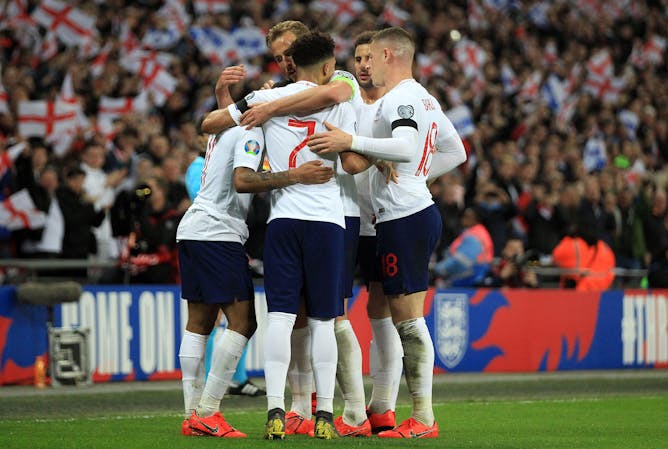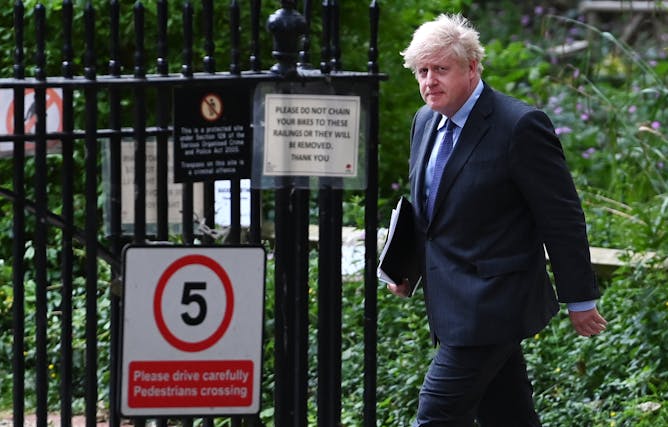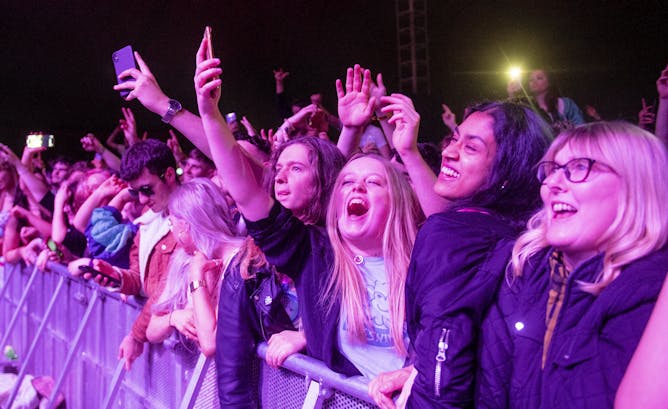|
|
|
|
Football may finally be coming home, but when national teams are shaped by global movement and immigration, “home” takes on a different meaning. This piece dives into the long, complex relationship between sport and national identity, and asks whether football success can usher in a new, more inclusive appreciation of “Englishness”.
While I called it “soccer” until a couple of weeks ago, I’ve really gotten into the spirit of cheering on England’s football team – and last night’s match certainly didn’t hurt! Plus, I can’t get that song out of my head. There are even mental health and social benefits from a tournament success – I think the past year and a half (and counting) certainly calls for a bit of a national “therapy session”.
But you won’t have long to bask in the stress-free glow before COVID infections could surge to 100,000 cases a day, with the UK government announcing that all restrictions in England will probably be lifted on July 19. It’s a tough political and health decision that could be Boris Johnson’s biggest gamble yet. While the nation is divided over whether it’s the right time to lift restrictions, this piece paints a picture of what “living with the virus” will look like.
And with the Euros final not the only big event now taking place, we hear how scientists are tracking whether such mass gatherings are helping spread the virus.
|
Avery Anapol
Commissioning Editor
|

|
|

Andrew Orchard / Alamy Stock Photo
Johan Rewilak, Aston University; Daniel Fitzpatrick, Aston University
Could a national football team of multicultural players usher in a more inclusive version of Englishness?
|

Andy Rain / EPA-EFE
Matthew Flinders, University of Sheffield
Ending lockdown on July 19 will be the biggest gamble of Johnson's political career.
|

Sefton Park Pilot music festival was attended by 5,000 people.
Peter Powell/EPA-EFE
Simon Maskell, University of Liverpool; Iain Buchan, University of Liverpool
Knowing how much virus someone has in their body when testing positive for COVID-19 allows you to estimate when they picked up the virus.
|
Health + Medicine
|
-
Dominic Wilkinson, University of Oxford; Jonathan Pugh, University of Oxford; Julian Savulescu, University of Oxford
Children should only be excluded from school if they are unwell.
-
Andrew Lee, University of Sheffield
When to reopen is a difficult decision that has required authorities to look for the least bad option.
-
Valerie Ness, Glasgow Caledonian University; Jacqui Reilly, Glasgow Caledonian University; Kareena McAloney-Kocaman, Glasgow Caledonian University; Kay Currie, Glasgow Caledonian University; Lesley Price, Glasgow Caledonian University
With nurse prescribing expanding globally, it's important they are properly guided and supported when it comes to antibiotics and managing patient expectations.
|
|
Arts + Culture
|
-
Brendan Canavan, University of Nottingham
As the prospect of international travel becomes increasingly complicated, it's worth considering more unconventional options
-
Mark Collard, Simon Fraser University; Keith Dobney, University of Sydney; Kimberly Plomp, Simon Fraser University
New analysis of Anglo-Saxon skulls suggests that being an Anglo-Saxon was a matter of language and culture, and not genetics.
-
Keith Rathbone, Macquarie University
The IOC was under considerable pressure to host the 1920 games. While a noble goal, it resulted in significant hardships for war-torn Belgium and the athletes themselves.
|
|
Politics + Society
|
-
James Rumbold, Sheffield Hallam University
International football tournaments take us on a rollercoaster of emotions. After the stresses of the past 15 months, watching matches with friends can keep us on a more even keel.
-
Leonie Ansems de Vries, King's College London
Priti Patel's plan to process asylum seekers offshore is at odds with the UK's responsibilities under international human rights conventions.
|
|
Environment + Energy
|
-
Martin Mayer, Aarhus University; Richard Michael Gunner, Swansea University
Sat-navs could one day warn motorists when they drive through high-risk areas.
|
|
| |
Featured events
|

|
Sustainable Places Research Institute, Cardiff University, Cardiff, Cardiff [Caerdydd GB-CRD], CF10 3BA, United Kingdom of Great Britain and Northern Ireland — Cardiff University
|

|
University of Essex, Wivenhoe Park, Colchester, Essex, CO4 3SQ, United Kingdom of Great Britain and Northern Ireland — University of Essex
|

|
Sustainable Places Research Institute, Cardiff University, Cardiff, Cardiff [Caerdydd GB-CRD], CF10 3BA, United Kingdom of Great Britain and Northern Ireland — Cardiff University
|

|
University of Essex, Wivenhoe Park, Colchester, Essex, CO4 3SQ, United Kingdom of Great Britain and Northern Ireland — University of Essex
|
|
|
|
| |
| |
| |
| |
| |
|
|
|
|
|
|
|